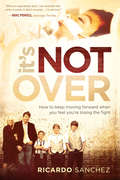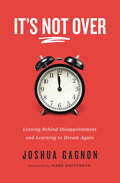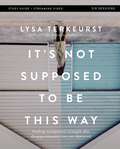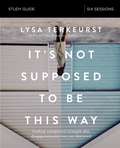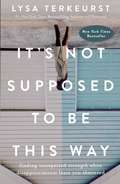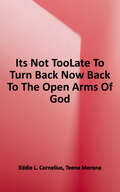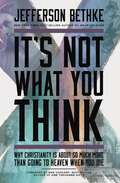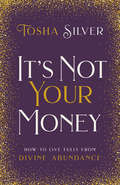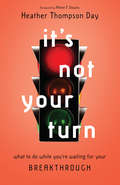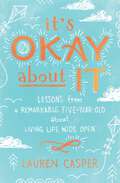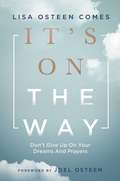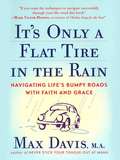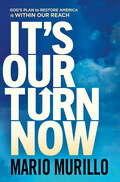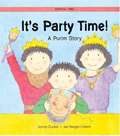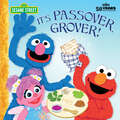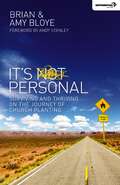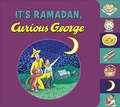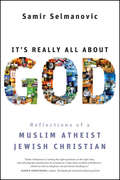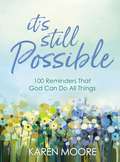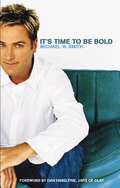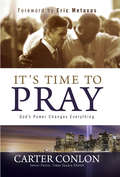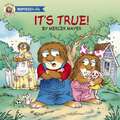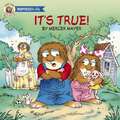- Table View
- List View
It's Not Over: How to Keep Moving Forward When You Feel You're Losing the Fight
by Ricardo Sanchez“911 CALL HOME” “URGENT CALL ME” “Josiah has been hurt, call ASAP” It’s every parent’s nightmare. As worship leader Ricardo Sanchez’s flight touched down and he turned on his cell phone, he was bombarded with desperate texts and phone messages from his wife. There had been an accident, and his son’s life was hanging in the balance. How do you find the endurance to keep going when the pain seems overbearing? How do you run to win when you feel the very wind has been knocked out of you? In It’s Not Over Ricardo shares how his family found the strength and hope to make it through their darkest hour. If you’ve lived life, you’ve experienced pain. Whether it’s the day-to-day hustle or a tragic incident, it sometimes seems as if there’s a force that wants to take you out of the game. This powerful true story will inspire and encourage you to trust God and allow the work of the Holy Spirit to bring you supernatural peace.
It's Not Over: Leaving Behind Disappointment and Learning to Dream Again
by Joshua GagnonDo you feel like you&’ve settled for a life less than you once desired? The good news: it&’s not over! It&’s Not Over is a book for anyone who has ever felt discouraged, detoured, or disappointed by the path of their life and who longs to dream big again.&“Whether you are overcoming a disappointment or simply dreaming big, this book will build your faith and inspire you to do more than you thought possible.&” - Craig Groeschel, pastor of Life.Church and New York Times bestselling authorPursuing a dream is essential to living a life with purpose. Yet we often bury our burning desires and dreams deep in our hearts because it seems as if there&’s no way we can accomplish them. In It&’s Not Over, pastor Joshua Gagnon, founder of the Next Level Church network, reminds us that we were born to dream—and to dream big. In fact, our dreams have the power to shape our lives.Join Joshua in discovering the answers to these questions and many more:• How do you determine what your God-sized dreams are?• How does dreaming help you discover your purpose?• How do you overcome disappointment and find hope again?• How do you pray bold prayers when you don&’t feel like praying at all?If you find yourself minimizing your dreams or feeling like you&’re settling in your life, the good news is you have time! As long as you have breath in your lungs, God has a dream for you to chase. Start identifying your God-sized dreams today and take action towards achieving them. It&’s what you were created for. And you can start today.
It's Not Supposed to Be This Way Bible Study Guide plus Streaming Video: Finding Unexpected Strength When Disappointments Leave You Shattered
by Lysa TerKeurstIn this six-session video Bible study (streaming included), New York Times bestselling author Lysa TerKeurst offers a safe place to share your disappointments, fresh biblical insight to get you through painful situations, and life-giving perspectives for living between Eden and eternity.Life often looks very different than we hoped or expected. Some events may simply catch us off guard for a moment, but others shatter us completely. At times like these, it's easy to feel disappointed and disillusioned and to wonder about the reality of God's goodness.So what do you do when God's timing seems questionable, his lack of intervention hurtful, and his promises doubtful?Lysa understands this deeply. But she's also discovered that our disappointments can be the divine appointments our souls need to radically encounter God. In this video Bible study, Lysa invites small groups and individuals into her own journey of faith. With vulnerability and honest humor, she helps us:Learn how to better process unmet expectations and other painful situations.Train ourselves to recognize the three strategies of the enemy so we can stand strong and persevere through unsettling relationships and uncertain outcomes.Discover the secret of remaining trustful when God seems to give us more than we can handle.Shift our suspicion that God is cruel or unfair to the biblical assurance that God is protecting and preparing us for what's next.Know how to encourage a friend and help her navigate hard realities with real help from God's truth.This study guide has everything you need for a full Bible study experience, including:The study guide itself--with group discussion prompts, activities, personal Bible study, video notes, and a leader's guide.An individual access code to stream all six video sessions online (DVD also available separately).Sessions and video run times:The Birthplace of Disappointment (27:30)Living Between Two Gardens (18:00)Problems Placed on Us and Problems Within Us (18:00)The Four Steps of Restoration (15:00)When the Enemy Comes Against Us (16:00)Kingdom Minded, Eternally Focused (21:00)Watch on any device!Streaming video access code included. Access code subject to expiration after 12/31/2027. Code may be redeemed only by the recipient of this package. Code may not be transferred or sold separately from this package. Internet connection required. Void where prohibited, taxed, or restricted by law. Additional offer details inside.
It's Not Supposed to Be This Way Study Guide: Finding Unexpected Strength When Disappointments Leave You Shattered
by Lysa TerKeurstWhat went wrong? Why did God let this happen?Reality often ends up so very far from the life we long for, doesn’t it? Bible teacher Lysa TerKeurst deeply understands daily disappointments and life-altering loss. By walking through her own valley, she’s discovered that in God we can find unexpected strength as we wrestle well between our faith and feelings.In this six-session video Bible study, Lysa offers a safe place to share your disappointments, fresh biblical insight to get you through painful situations, and life-giving perspectives for living in between Eden and eternity.With solid truth, vulnerability and honest humor, Lysa will help you:Find peace and hope for the future when you feel like your life is not what you expected.Stop being pulled into the anxiety of disappointment by discovering how to better process unmet expectations and other painful situations.Train yourself to recognize the three strategies of the enemy so you can stand strong and persevere through unsettling relationships and uncertain outcomes.Discover the secret of being steadfast and not panicking when God actually does give you more than you can handle.Shift your suspicion that God is cruel or unfair to the biblical assurance that God is protecting and preparing you.Know how to encourage a friend and help them navigate hard realities with real help from God's truth.Sessions include:The Birthplace of DisappointmentLiving Between Two GardensProblems Placed On Us and Problems Within UsThe Four Steps of RestorationWhen the Enemy Comes Against UsKingdom Minded, Eternally FocusedDesigned for use with It’s Not Supposed To Be This Way Video Study (9780310094364), sold separately.
It's Not Supposed to Be This Way: Finding Unexpected Strength When Disappointments Leave You Shattered
by Lysa TerKeurstNew York Times bestselling author Lysa TerKeurst unveils her heart amid shattering circumstances and shows readers how to live assured when life doesn't turn out like they expected.What do you do when God’s timing seems questionable, His lack of intervention hurtful, and His promises doubtful?Life often looks so very different than we hoped or expected. Some events may simply catch us off guard for a moment, but others shatter us completely. We feel disappointed and disillusioned, and we quietly start to wonder about the reality of God’s goodness.Lysa TerKeurst understands this deeply. But she's also discovered that our disappointments can be the divine appointments our souls need to radically encounter God. In It's Not Supposed to Be This Way, Lysa invites us into her own journey of faith and, with grit, vulnerability, and honest humor, helps us to:Stop being pulled into the anxiety of disappointment by discovering how to better process unmet expectations and other painful situations.Train ourselves to recognize the three strategies of the enemy so we can stand strong and persevere through unsettling relationships and uncertain outcomes.Discover the secret of being steadfast and not panicking when God actually does give us more than we can handle.Shift our suspicion that God is cruel or unfair to the biblical assurance that God is protecting and preparing us.Know how to encourage a friend and help her navigate hard realities with real help from God's truth.
It's Not Too Late to Turn Back Now: Back to the Open Arms of God
by Eddie L. CorneliusThis book is a memoir of Eddie L. Cornelius. Former singer of the 70s group Cornelius Brothers and Sister Rose. The book details his journey in life before and after finding his way to God through Jesus Christ.
It's Not What You Think: Why Christianity Is About So Much More Than Going to Heaven When You Die
by Jefferson BethkeJoin Jefferson Bethke, New York Times bestselling author of Jesus > Religion, as he challenges the accepted view of contemporary Christianity with the world-changing message that Jesus actually brought.Jesus was most upset at people for seeing but not seeing. For succumbing to the danger and idolatry of forcing God into preconceived human ideals. But what if there were a better way? What if Jesus came not to help people escape the world but instead to restore it?It's Not What You Think tells the familiar stories of the scripture in a radically new light, presenting God&’s unchanging truths from the Old and New Testaments as the challenging story that it is: a mysterious, compelling narrative with God at the center.Along the way, Bethke reminds us of the life-changing message of Jesus that turned the world upside-down--a world that God is putting back together--teaching us how to:Uncover our true purpose and satisfy our longing for significanceFind the kingdom of God wherever we areEmbrace the gifts of fellowship and communityPraise for It's Not What You Think:"With a deep discernment of the times we're living in, Jefferson spotlights many misinterpreted truths in the Bible and puts a voice to the true heart of God's Word. His desire to bring us into a more intimate encounter with God jumps off of each page. Christians need this book--now more than ever!"--Lysa TerKeurst, New York Times bestselling author of Forgiving What You Can't Forget and president of Proverbs 31 Ministries"It's easy to get stuck in life. To let our faith grow stagnant, our walk grow weary, and our hope grow silent. Jefferson isn't okay with that and has created a book that turns what we think we know upside down. Creative, honest, refreshing. I'm a huge fan of the heart that explodes from this book."--Jon Acuff, New York Times bestselling author of Do Over: Rescue Monday, Reinvent Your Work & Never Get Stuck
It's Not Your Money: How to Live Fully from Divine Abundance
by Tosha SilverFrom the author of the acclaimed Outrageous Openness, a witty and spirited guide to radically releasing the burden of financial fearsIt's natural to crave prosperity. Some seek to manifest it in myriad ways--using anything from vision boards to writing a pretend check for a million dollars from the Bank of Divinity. Yet whatever comes, or doesn't, the mind always seems to want more.But what if there was a whole other way? Instead of grasping and chasing, what if we offered everything--our money (or lack of it), our triumphs, our problems, our desires--fully back to Love? What if this offering itself was actually the secret to abundance?Tosha Silver, internationally beloved spiritual guide, has created a practical and powerful financial book unlike any other. Leading you through a deeply transformative eight-week process, she shares the mental, emotional, and spiritual steps that anyone can take to learn to fully receive and prosper. Her step-by-step guidance is filled with prayers, meditations, and stories to help you find and heal the source of these fears and unworthiness. As you come to know you are part of something larger--something that you serve and that longs to serve you--you begin to feel a new sense of freedom and abundance.
It's Not Your Turn: What to Do While You're Waiting for Your Breakthrough
by Heather Thompson DayWhat do you do when it seems like everybody else is getting their dreams and you're not? You don't have to be distressed when Instagram comparison makes you feel like others are more successful than you. Heather Thompson Day shows us to what we can do to shape ourselves while waiting, so we are ready when it's our turn. She unpacks instant gratification and peer comparison in a social media world, and teaches how we can cultivate perspectives and practices that will enable us to be more content, patient, and constructive. We can learn to walk slowly and trust God to do his work in us, being more present in our relationships rather than striving for premature image-based success. Your turn will come. Here's what you can do to get there.
It's Ok! I Had a Stroke: A journey of faith and healing
by Sheila LloydHappy in his dream career as a restorer of exotic Italian sports cars, suddenly life comes to a screeching halt at age 46 with the question, “What now?!” Brian Lloyd journeys from fast track to fervent faith--learning to call on God in the midst of the storm:As I started realizing what was happening, I noticed I had lost function on the entire left side of my body. You know, when you're suddenly unable to move . . . the 911 call is for you and the rescue squad arrives--that's a sobering feeling. You can't even put yourself on the stretcher, and these strangers have to pick you up and move you. You see your wife trying to be strong, but you see the worry and despair in her eyes. I didn't even get to see my children. Just heard friends say they would stay with the kids. Then I’m watching the house--all I hold dear in the world, really--disappear through the back window of the ambulance as it pulls out of the driveway. I realized I might be facing the end of all I was and would be in this world. You never know how you'll react to that until you encounter such a situation--that's where the rubber meets the road. You're faced with the fact that this could very well be the end of your life as you know it. Either you're ok with that, or you're not. I said, “God, I'm yours. Either take me or use me. You're God; I'm not. I'm simply yours.” At that point God becomes very, very real to you!
It's Okay About It: Lessons from a Remarkable Five-Year-Old About Living Life Wide Open
by Lauren CasperPopular blogger Lauren Casper shares poignantly simple yet profound wisdom about removing the barriers we construct around our hearts and doing life full-on, all from the least expected source: her five-year-old son, Mareto. Five-year-old Mareto finds color and light in the ordinary happenings of every day and delights in beauty just waiting to be found. Those are lessons he shares, often unknowingly, with his mom, Lauren Casper. For Lauren, living with Mareto is a lot like playing the telephone game. He blurts out little phrases that have their origin in something he saw or heard, but by the time they make their way through his mind and back out of his mouth, they’ve transformed—often into beautiful truths about living a simple, authentic, love- and joy-filled life. From “it’s okay about it,” a simple reminder that even when life is painful or difficult, things will be okay because God promises never to leave or forsake his children, to “you’re making me feelings,” which teaches the importance of leaning into one’s emotions and, in doing so, sharing a piece of oneself with loved ones—Mareto’s simple yet profound wisdom is a reminder to embrace the broken beauty of life, to believe in a God bigger than human comprehension, and to love others even when it doesn’t make sense. For all those looking to recapture the faith, simplicity, wonder, hope, courage, and joy of life, It’s Okay About It provides a guide to look inward and live outward, to discover the most wide open and beautiful life possible.
It's Okay to Cry: A Parent's Guide to Helping Children Through the Losses of Life
by H. Norman WrightHelp Your Child Heal From Life's LossesA favorite toy breaks . . . . A pet dies . . . It's Okay to Cry.Parents divorce and you're forced to move . . . It's Okay to Cry.A best friend is hurt badly . . . . A grandparent dies . . .It's Okay to Cry.Look through the eyes of a child again. When something unexpected, disappointing, or traumatic occurs, children feel a very real sense of loss. They may respond with fear or with anger. Most likely they are confused. They have questions they want answered. They need help from their parents or others who care to understand and process their grief. It's Okay to Cry offers practical help for parents. It explains the symptoms of loss and unresolved grief so that parents can recognize them and walk alongside their children on the path to recovery.Well-known and respected author H. Norman Wright speaks to parents with sympathy and reassurance. He recognizes that most parents don't know how to teach their children to process loss, because often they weren't taught themselves. His sage advice will give you and your child the comfort and hope you seek.From the Trade Paperback edition.
It's On the Way: Don't Give Up on Your Dreams and Prayers
by Lisa Osteen ComesIn this inspiring spiritual guidebook, the Associate Pastor of Lakewood Church demonstrates how to keep an attitude of faith in times of discouragement and to trust God in every season.At times, we all find ourselves in seasons of waiting—for our dreams to be fulfilled, our prayers to be answered, or our circumstances to change. But your dream has an appointed time and God always has victory in store for you. And the seasons of waiting don't need to be periods of discouragement or hopelessness. Instead, they can be rich periods of joy, growth and preparation for the plans and promotion that God has in store for you.In It's On the Way, Lisa Osteen Comes reminds readers that during these inevitable times in our lives, God is faithful and our current season is temporary. Lisa teaches readers how to press through challenges, quit taking shortcuts instead of trusting God to give you His best, allow God to fight your battles, and silence the enemy within, while giving encouragement and practical steps to take when you don't know what to do next.
It's Only a Flat Tire in the Rain: Navigating Life's Bumpy Roads With Faith and Grace
by Max DavisNo matter how much people plan, prepare, or prevent, adversity still finds a way to surprise us. Max Davis believes everyone has the ability to turn tragedy into triumph, hurt into happiness, and outrage into outreach. This wonderful book uses old-fashioned values, new-fashioned wisdom, real-life stories of everyday people, and a big dose of faith to help people become problem solvers, not victims. <P> "If you want the techniques to navigate successfully through your life-read this book. " (Mark Victor Hansen, co-creator of Chicken Soup for the Soul) <P> "[Davis] displays a refreshing combination of honesty, humility, optimism, and faith. This attitude. . . not only strengthens his credibility as an adviser to the suffering but also sets the book apart; unlike most authors who tackle these topics, Davis yields a book infused with lightness that does not actually make light of the serious topics it covers. " (Publishers Weekly) <P> "This book will be of interest to readers who are believers of any faith but also to those who are not believers but are open-minded and curious. " (Sunday Advocate, Baton Rouge, LA)
It's Our Turn Now: God's Plan to Restore America is Within Our Reach
by Mario MurilloHow can we ever hope for the world to get better if we keep limiting what God can do? After reading this book, you will step up with courage to be a part of the hope that the world needs against a destructive culture. God has called you to be a witness of light in the middle of the darkness, and you will obey Him with boldness and integrity. Everyone living on the planet today has a front-row seat to the failure of communism, socialism, and immorality. People are sick to death of the fabrications, lies, control, and tyranny. Mario Murillo draws on his recent experiences in California, where his ministry is experiencing souls being saved at a rate that surpasses even what was seen during the Jesus movement of the 1960s and &’70s. It&’s accelerating, and Murillo believes it&’s a worldwide trend that has us poised for an unprecedented opportunity as the body of Christ. We must seize this moment! In It's Our Turn Now, Murillo explains why now is the time for Christians to do the following:Explain why everything man has taught us is bankrupting our morals and our soulsDisplay the supernatural with integrity and clarity that we&’ve not seen beforeAnswer directly the questions that are truly on the hearts and minds of the human race We are no longer the remnant. There are millions of us, and it's time to stop believing the false reports and listen to what people around us are feeling. We have the answers a hungry world is dying for. Only the gospel of Jesus Christ can deliver us, and only the church can change the world through its power. It&’s our turn to step up and stop limiting God.
It's Party Time: A Purim Story
by Jonny ZuckerA mother, father, and three young children in a typical Jewish family celebrate their most important holidays in the attractively illustrated Festival Time books, which speak not only to Jewish children but to boys and girls of all faiths. Ages 3-7
It's Passover, Grover! (Pictureback(R))
by Jodie ShepherdA Sesame Street Passover story with stickers, a poster, and a card game!It's Passover on Sesame Street, and Grover invites a few friends to a Seder at his house. More and more guests show up, and room is made at the table to honor the traditional Passover invitation: "Let all who are hungry come and eat." Girls and boys ages 2 to 5 will particularly enjoy the story's focus on the exciting hunt for the Passover afikomen, a piece of matzah that's hidden for the children to find. A brief explanation of the history and customs of Passover is included at the end. Stickers, a poster that shows a splendid Seder plate, and a press-out matching card game add to the holiday fun. The messages of inclusion and friendship make this colorful paperback storybook particularly timely.
It's Personal: Surviving and Thriving on the Journey of Church Planting (Exponential Series)
by Andy Stanley Amy Bloye Brian BloyeEvery aspect of planting a church is personal. Like giving birth to a child, church planters give all they have to start new churches. So when people leave the church or criticize it, it’s hard not to take it personally. And while many pastors feel called by God to plant new churches, few are prepared for the inevitable toll it can take on their lives…and their families and friendships. Brian and Amy Bloye know firsthand that planting churches isn’t easy. While planting a church, they learned that God does not promise to make up for mis-guided priorities. In this book they talk about having a healthy marriage, raising children, finding the right bal-ance of family and ministry, dealing with spiritual warfare, staffing and leadership challenges, and dealing with criticism—issues every church leader must deal with. An authentic manual for day -to -day life in ministry, couples will learn to identify and relate to experiences in the book, and will come away feeling empowered and inspired to thrive - not only in planting a church, but also for the long haul of life and ministry. They will also be challenged and encouraged to avoid some of the pitfalls of planting a church and be equipped to build, not just strong, prevailing ministries, but healthy marriages and families. It will also include intimate interviews in each chapter with several church planting couples who will open up their personal lives to give the reader some practical, real, authentic advice on dealing with some of the chal-lenging issues that church planters face everyday.
It's Ramadan, Curious George (Curious George Ser.)
by Hena Khan H. A. Rey H. A. ReyGeorge celebrates Ramadan with his friend Kareem. “A groundbreaking new book that also tries to span the cultural chasm for a new generation.” —The New YorkerGeorge helps Kareem with his first fast and joins in the evening celebration of tasting treats and enjoying a special meal. Then George helps make gift baskets to donate to the needy, and watches for the crescent moon with the man in the yellow hat. Finally, George joins in the Eid festivities to mark the end of his very first Ramadan.This playful book makes a great holiday gift for all fans of Curious George—those who celebrate Ramadan, and those who are learning about it for the first time.“To help overcome Islamophobia and foster mutual respect, acceptance and understanding, teachers, parents, community leaders and librarians can use books like these to educate children about Muslims while enhancing religious literacy.” —The Huffington Post “I hope [this book] makes it into the hands of Muslim children who need it and any child curious about Ramadan and Islam. Parents, this is how we teach love.” —Read It Real Good
It's Really All About God
by Samir SelmanovicA fresh exploration of a redeeming, dynamic, and radically different way to hold one's religionSamir Selmanovic--who grew up a in a culturally Muslim family in Croatia, converted to Christianity as a soldier in the then-Yugoslavian army, and went on to become a Christian pastor in Manhattan and in Southern California--looks at how our ongoing and sometimes violent power struggles over who owns God and what God wants for the world and its peoples are not serving God, humanity, or our planet.Shows how our religions have become self-serving, God-management systems, however Selmanovic contends--change is possibleOffers a path for people of all faiths and traditions for living together on our fragile earthKaren Armstrong said that the book is "asking the right questions at the right time"This is a personal story and a moving exploration of a new way of treasuring one's own religion while discovering God, goodness, and grace in others and in their traditions.
It's Still Possible: 100 Reminders That God Can Do All Things
by Karen MooreNothing is impossible with God. Whether you are 15 or 85, God is still able to create greatness in your life. Building and mending relationships, navigating major life events, and new beginnings are all possible with Him. God not only knows your longings, He provides for them.It&’s Still Possible by award-winning author Karen Moore includes:100 devotions focused on possibility, hope, and faithScripture verses and heartfelt prayersReflections for deeper connectionReadings for people encountering disappointment and discouragement, such as Believe the Impossible, It&’s a New Day, and Abundant LifeThis is perfect for anyone who longs to draw closer to our generous Creator and feel uplifted and encouraged that with God anything is possible. It&’s Still Possible is a great gift for Mother&’s Day, International Friendship Day, birthdays, anniversaries, and even as a self-purchase.God promises us abundant joy—even in the middle of the mess. After all, in God&’s hands, all things are possible.
It's Time to Be Bold
by Michael SmithMichael W. Smith has seen with clarity the spriritual poverty and emotional numbness of teens who are out of touch with God's love. He writes, "Somewhere along the way, I had forgotten what the real world was like. But something was starting to break inside of me. God began to renew a heart of compassion for the lost. From then on, I decided that if God was opening a door for me, I wasn't going to waste any time making up my mind about entering it." It's Time to Be Bold is a call to commitment for all believers, a personal and heartfelt cry rallying youth to follow Christ's example. Drawing from events in his own life, Michael dicusses with relevance the essential issues of living out extreme faith. Topics include: The importance of Christian friends Standing stong against Satan's attacks Using crises as stepping stones to deeper faith Getting into the Word and growing in a lifestyle of prayer An Xt4J book
It's Time to Pray: God's Power Changes Everything
by Carter ConlonForeword by Eric Metaxas. Prayers activate God's power and God's power changes everything. There are far too many Christians who are walking around dejected, depressed, hopeless, powerless, and in bondage to the flesh. Yet this is not what the Christian life is or should be. Jesus Christ fulfilled the will of the Father and together made a new covenant—one that set us free from the enslavement of sin and gave us new life. Through the shed blood of Christ on the cross and His resurrection, Jesus restored our relationship with the living God and enabled us to live an abundant life! Though we will experience difficulties, in the midst of these things we are not powerless and without hope. Our power and hope is in God, and the Holy Spirit empowers us to live above the fray! The most powerful thing we can do in our lives is PRAY! The Bible tells us to pray without ceasing and to pray about everything. If you are struggling in your walk, if you look at the world around you and feel dejected, look up, for your redemption is nigh! Join Pastor Carter in this book as he looks at the lesson Jesus gives us in Mark 9—along with some of his own personal experiences and testimonies—and how it relates to us, our walk with God, and our impact on the world. You will find, as Pastor Carter has, that it&’s time to pray! Each chapter contains a section titled &“Important Takeaways from This Chapter&”, which includes key thoughts, key words, and key insight.
It's True (Little Critter:)
by Mercer MayerJoin Little Critter® as he learns why it's important to tell the whole truth--and not just part of it.Since 1975, Mercer Mayer has been writing and illustrating stories about a little ball of fur named Little Critter and the antics he stumbles into while growing up. Thomas Nelson is thrilled to bring this beloved brand to the Christian market with the launch of Inspired Kids, a new line of faith-based books featuring Little Critter.Little Critter thinks that sometimes it's easier to tell part of the truth instead of the whole truth. In this second book in the Inspired Kids line, Little Critter learns quickly that lying has consequences and that telling the truth, no matter how hard, is always the right thing to do.
It's True (Little Critter:)
by Mercer MayerJoin Little Critter® as he learns why it’s important to tell the whole truth—and not just part of it.Since 1975, Mercer Mayer has been writing and illustrating stories about a little ball of fur named Little Critter and the antics he stumbles into while growing up. Thomas Nelson is thrilled to bring this beloved brand to the Christian market with the launch of Inspired Kids, a new line of faith-based books featuring Little Critter.Little Critter thinks that sometimes it’s easier to tell part of the truth instead of the whole truth. In this second book in the Inspired Kids line, Little Critter learns quickly that lying has consequences and that telling the truth, no matter how hard, is always the right thing to do.
